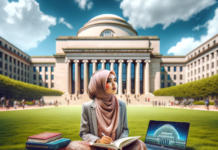About 8 months ago, I wrote an opinion piece emphasizing that a Bachelor of Arts degree is not degree of unemployment. I wrote about world leaders and public figures who have changed the world in their own way, and the underlying fact that they all studied an Arts or Liberal Arts degree.
Following this, I have decided to chat with 4 Bachelor of Arts graduates from the University of Melbourne who are now venturing their own world of opportunities. Simply put, their current venture shows the various opportunities that an Arts degree allows one to explore. Moreover, I want to underline that they are common people just like you and me.
I have spoken to Bianca Winata, Hadi Ismanto, Risyad Ganis, and Steven Tannason, who told stories of their interesting takes in life after university.
Bianca Winata, Part-time Curatorial Project Assistant and Freelance Arts & Design Writer
What did you study at Melbourne Uni and which year?
I started my Bachelor of Arts degree at Melbourne Uni in 2013 and recently graduated in July 2016. I studied Art History and Media Communications.
Please tell us a bit about what you do now or what you’ve been doing after Uni
I am a part-time curatorial project assistant and events officer at Multicultural Arts Victoria (MAV). With MAV, I am responsible for assisting two projects: What Happened at the Pier #2 and Mapping Melbourne 2016, a multi-art form festival for independent artists, providing a platform for new Australian/Asian intercultural work in December.
I am also a freelance arts and design writer for Broadsheet Melbourne, covering the arts scene around Melbourne.
Apart from those two jobs, I am also a Gallery Assistant at No Vacancy Gallery, and a Front of House at Centre for Contemporary Photography and Events Volunteer at Australian Centre for Contemporary Art (ACCA).

If you were to reflect back to your studies, what about it that you think benefited you the most?
One of the most valuable lessons that I gained from my studies is to be versatile. Having an Arts degree allows me to explore different fields, from curatorial work to finance management. I may specialize in neither business or finance, but throughout my studies I was always encouraged to break boundaries and never stop learning. I picked up the arts management aspects pretty quickly and was able to juggle both the artistic and managerial aspects of my jobs. I find that all the essay questions I received from both of my majors advocate a concept allowing gaps and collisions, which later translate to critical thinking, versatility and creativity.
If you can share some tips and tricks to Indonesian students studying Arts at Melbourne Uni, what would they be?
Internships and volunteering are critical. Don’t be afraid of unpaid jobs because they will benefit you in the long run. I think studying an Arts degree at Melbourne Uni would be an even more valuable experience if you could apply what you learn to the real world. Also, grades and majors are not everything. It is not the end of the world if you have a sub-H1 average or if your major is not among the most lucrative ones. Keep on pursuing work experience as it is your network that will most likely drive your career. In a nutshell, have a good balance of work experience and studies, be curious and creative, and keep on doing the readings no matter how boring it may be.
Hadi Ismanto, Publisher and Director of Manual Jakarta, MALT, and The Third Company
What did you study at Melbourne Uni and which year?
I studied Bachelor of Arts in Media and Communication from 2011 to 2013
Please tell us a bit about what you do now or what you’ve been doing after Uni
I started a media company in 2013 with a vision to challenge the standard of media industry in the country. Manual Jakarta, a lifestyle online magazine, was our first project. We then extended our venture into a graphic design agency called MALT, and this year our latest venture is a content-driven social media agency called The Third Company.

If you were to reflect back to your studies, what about it that you think benefited you the most?
I would say what benefits me the most is the freedom and the flexibility that my course offered. Surely the opportunity to touch and explore on other various Arts-based concentrations has helped to expand my perspectives, both academically and professionally. More than that, however, is how it allows me to explore and be exposed to the exciting and diverse experiences that Melbourne has to offer. Due to the flexible hours, I was able to volunteer in Meld magazine as a journalist and work as an Editor for OZIP magazine – among other volunteering and short course experiences that I took.
If you can share some tips and tricks to Indonesian students studying Arts at Melbourne Uni, what would they be?
I would encourage everyone to go out there and get to experience what Melbourne has to offer as much as they can. When you go and experience the city in various ways, do actively think of how they actually do it; think of how Indonesia can probably benefit from that (pardon my sense of patriotism) and never never let yourself, especially your mind, to stay idle. After all, those two or three years will go faster than you thought they would be and while we get to afford it (both time-wise and financially), it would be a waste to not maximise the opportunity.
Risyad Ganis – Co-Founder of Crowde
What did you study at Melbourne Uni and which year?
I studied Bachelor of Arts majoring in Economics and Politics & International Studies. I started in 2011 and graduated in 2014 from the University of Melbourne.
Please tell a bit about what you do now or what you’ve been doing after Uni.
Currently, I’m starting my own startup, Crowde, which is a fin-tech (financial technology) startup that focuses on agricultural business. I have been doing this since February 2016. Prior to this, I work as an analyst for Willis Towers Watson, an HR consulting firm. Other than that, I have also been helping my father at our family-owned business in property industry since I moved back to Indonesia.

If you were to reflect back to your studies, what about it that you think benefited you the most?
What I think have benefited me the most from an Arts degree is that I was able to learn quantitative skills as much as qualitative skills at the same time. This might be due to the fact I majored in politics and economics. I learnt how to do research and write an essay systematically, I have also read a lot of journals and books, but on the other hand the economics subjects heavily rely on our quantitative skills. Hence, I ended up having both my quantitative and qualitative skills rigorously trained.
If you can share some tips and tricks to Indonesian students studying Arts at Melbourne Uni, what would they be?
I think it is very important for you to know why you chose Arts degree in the first place and what you want to do with that degree after you graduate. University life is challenging and is not gonna be easy for sure, but if you know the reason why you do it, it will make your life much easier. Essentially, it is not just about obtaining sufficient grade to pass every subject, but what matters most is to really enjoy the process. Also, don’t stay too long at the library, it is not healthy.
Steven Tannason, Strategic Product Partnerships at Google
What did you study at Melbourne Uni and which year?
I studied and graduated with a Bachelor of Arts majoring in media and communications in 2012 from the University of Melbourne. I also took breadth subjects (electives) in a mix of psychology, marketing and management.
Please tell us a bit about what you do now
I currently work at Google in Singapore, doing product partnerships for Google Maps and Google Cultural Institute. For this job, I am tasked to help make our products work better for our users in the region.

If you were to reflect back to your studies, what about it that you think benefited you the most?
There are many, but if I were to choose one, it would be the freedom to think, research, think again and ultimately, build connections between ideas. Throughout my degree, I was exposed to a wide range of subjects, including my core communication and media studies, sociology, literature and even seemingly unrelated subjects such as psychology and marketing. As a result, it has helped to shape the way I think; as cliche as it may sound, it helps you to think outside the box.
If you can share some tips and tricks to Indonesian students studying Arts at Melbourne Uni, what would they be?
You have lots of time outside of your contact hours, hence, you have to make good use of it! Go learn new skills, volunteer, meet good people – anything that you’re passionate about to make a positive difference in the world!










